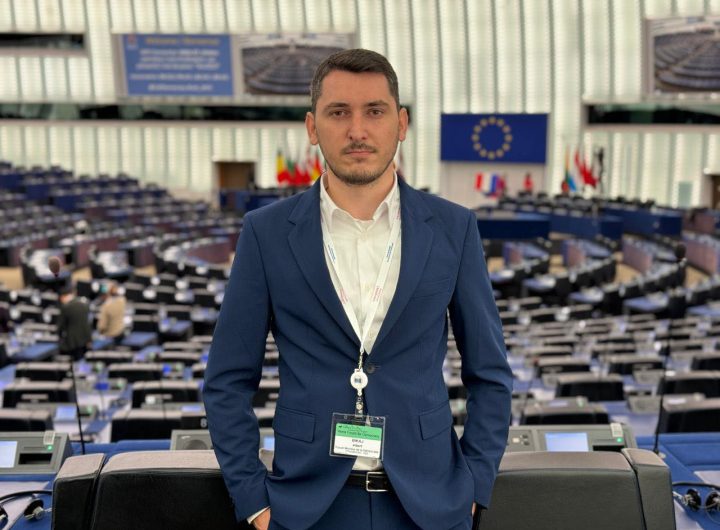
The European Union Ambassador to Kosovo, Aivo Orav, stated that the EU remains committed to supporting media freedom, fact-based journalists and their efforts to combat disinformation.
Speaking at a conference on the occasion of the publication of the report of the European Union Office and the Balkan Investigative Reporting Network – BIRN Kosovo entitled “Hate Speech and Disinformation during the 2025 Elections in Kosovo”, Orav emphasized that the European Union will continue to support initiatives that promote the strengthening of fact-checking mechanisms and strengthen local institutions in addressing these issues.
Regarding the disinformation report, the Ambassador said that it provides a detailed insight into the disturbing patterns of disinformation and hate speech that characterized the 2025 election process in Kosovo.
The report provides a detailed insight into the disturbing pattern of disinformation and hate speech that characterized the 2025 elections in Kosovo. Disinformation is more than just misleading context. It poses a direct threat to democracy, manipulates public opinion and undermines trust in institutions, – explained Orav.
Today’s findings, based on an in-depth analysis by BIRN Kosovo, will explain how this phenomenon occurred during the elections, who was behind it and what far-reaching impact it had on the democratic process. We will hear the main findings in the BIRN presentation, but I would like to highlight a few points. – he added.
Ambassador Orav also emphasized that the report shows how disinformation narratives are spread not only by political actors, but also by external actors.
The report shows how disinformation narratives were spread not only by political actors but also by external actors to undermine trust in the electoral process. The spread of hate speech and dehumanizing language was widespread among certain groups and individuals, specifically targeting women in positions of influence. – he said.
According to Orav, combating disinformation is not the responsibility of a single institution, but requires a collective effort.
However, combating disinformation is not the responsibility of a single institution, but requires a joint effort – from all of us: Politicians, journalists, fact-checkers and civil society. We must work together to create a media environment that is transparent, accountable and resistant to manipulation. – emphasized the EU ambassador.
The European Union Office in Kosovo and the Balkan Investigative Reporting Network – BIRN Kosovo published on Wednesday, 02.04.2025, the report on Disinformation: Hate Speech and Disinformation during the 2025 Elections in Kosovo.
Under this LINK you can find the full report.
The President of Kosovo, Vjosa Osmani, has stated that truth is the strongest weapon of democracy. And in her opinion, freedom itself is attacked when the truth is attacked.
At the presentation of the report by the European Union Office and the Balkan Investigative Reporting Network – BIRN Kosovo entitled “Hate speech and disinformation during the 2025 elections in Kosovo”, Osmani emphasized that fact-checking is no longer just a task for journalists, but has become an obligation for society as a whole.
Without truth, there can be no real democracy. Without truth, our decisions become uncertain, trust between citizens and institutions weakens and, above all, the space for disinformation and manipulation expands. – said Osmani.
The election campaign for the parliamentary elections in Kosovo was characterized by an unprecedented level of hate speech and disinformation from both domestic and foreign actors. This has polarized the electorate and raised doubts about the integrity of the upcoming elections in the absence of serious action, according to the report published on Friday by the European Union Office in Kosovo and the Balkan Investigative Reporting Network – BIRN Kosovo.
The report “Hate Speech and Disinformation in the 2025 Elections in Kosovo” provides an in-depth analysis of narratives disseminated or produced by the media before, during and after the 2025 parliamentary elections in Kosovo. Based on extensive monitoring of 20 television and radio stations, including two media outlets based in Belgrade and two in Tirana, as well as a review of over 4,000 online publications, the report analyzes the presence of hate speech and disinformation throughout the election period.
Although on the surface the parliamentary elections of February 9, 2025 were peaceful, highly competitive and resulted in a slight increase in the number of female representatives in the Assembly of Kosovo, the results show that hate speech, disinformation and divisive narratives were prevalent throughout the election period, in some cases even using artificial intelligence (AI), and were disproportionately targeted.
Although the Election Complaints and Appeals Panel (ECAP) in Kosovo held political parties responsible for 30 cases of hate speech, this did not result in the removal of offensive content from their websites and digital platforms. On election day alone, fact-checkers identified at least 100 cases of disinformation.
Throughout the election campaign, domestic and foreign actors, particularly in Serbia and Russia, exploited voters’ fears by issuing unfounded warnings of inter-ethnic violence and a possible war between Serbia and Kosovo. Russia in particular spread the story that current Prime Minister Albin Kurti was planning an ethnic cleansing of Kosovo Serbs with Western support. At the same time, it reinforced Serbia’s demonizing statements about the Kosovo Serbs who dared to run against the Belgrade-backed Serbian List party.
Domestically, political opponents of the main Albanian parties in Kosovo used inhumane and demonizing language – comparing their opponents to animals or calling them “mentally incompetent” or “Serbian spies”. Numerous media outlets became platforms for unverified, sensationalist and unfounded accusations that often went unchallenged. In a social experiment conducted by BIRN Kosovo, around 20% of politicians were unable to recognize a fabricated news item as fake news.
As the election campaign was dominated by divisive and polarizing rhetoric, there was a lack of objective discussions about the country’s most pressing problems. In addition, political parties and some media outlets have so far failed to provide sufficient transparency regarding political advertising spending.
Despite the electoral reforms adopted in 2023, the results of BIRN Kosovo call into question the ability of the authorities to combat disinformation and thus protect the right of voters to make a free and informed decision about their elected representatives.
The report emphasizes that urgent action is needed to ensure that authorities have sufficient capacity to counter domestic and foreign disinformation campaigns, to empower electoral and media regulators to effectively combat hate speech, to regulate the use of artificial intelligence and to improve transparency regarding campaign spending./Kallxo/

 Truth vs. Spin: What Does Humanitarian Intervention Really Mean?
Truth vs. Spin: What Does Humanitarian Intervention Really Mean?  SOUND CANNON BETWEEN RUSSIA AND SERBIA
SOUND CANNON BETWEEN RUSSIA AND SERBIA  Two women who spied for Russia tracked down and named by BBC
Two women who spied for Russia tracked down and named by BBC  Russia, Ukraine Agree Separately With US To Halt Military Force In Black Sea
Russia, Ukraine Agree Separately With US To Halt Military Force In Black Sea  Pentagon chief to visit Philippines for security talks, envoy says
Pentagon chief to visit Philippines for security talks, envoy says  Zelenskyy urges pressure on Russia as US-Ukraine talks begin
Zelenskyy urges pressure on Russia as US-Ukraine talks begin